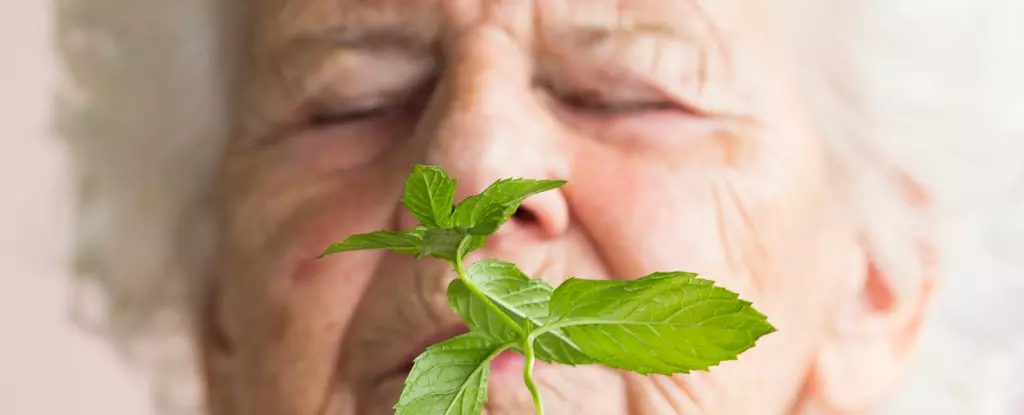In an era where the treatment of Alzheimer’s disease seems as elusive as ever, recent research shines a glimmer of hope. A groundbreaking study, published in April 2023, has unveiled a peculiar phenomenon: inhaling menthol might enhance cognitive performance in mice afflicted with Alzheimer’s. This discovery opens up new discussions about the potential of olfactory stimuli in therapeutic interventions. By understanding the intricate connections between smell, the immune system, and cognitive function, we might forge innovative treatment avenues that could significantly improve patient outcomes.
The olfactory system, traditionally regarded as purely responsible for the sense of smell, has been found to play a broader role in influencing both the immune and central nervous systems. Scientists from the Center for Applied Medical Research (CIMA) in Spain have taken a pioneering step by demonstrating that menthol, a compound commonly associated with a cooling sensation, acts as an immunostimulatory odor. This intersection between chemistry and biology raises compelling questions about how our perception of smells can affect our bodies on a cellular level.
Menthol and Cognitive Enhancement: A Double-Edged Sword?
With the alarming rise in dementia cases worldwide, every hint of a promising treatment is met with immediate scrutiny. This study’s findings suggest that not only does menthol halt cognitive decline in Alzheimer’s-stricken mice, but it also appears to enhance memory functionality in healthy young mice. The researchers, led by immunologist Juan José Lasarte, observed a noteworthy reduction in the interleukin-1-beta (IL-1β) protein—a crucial biomarker linked to inflammation and cognitive impairment. Being able to revert this protein to safe levels could potentially mitigate one of the significant harmful processes associated with Alzheimer’s disease.
However, while these findings are promising, they beckon a broader inquiry: could relying on olfactory stimuli like menthol prove to be a double-edged sword? On one hand, it appears to offer a non-invasive method for bolstering cognitive abilities. On the other, the fact that the same compound could exacerbate issues in certain contexts must be stressed. This underscores the necessity of rigorous testing and a categorical understanding of the differences between pathological versus healthy conditions before jumping to conclusions.
The Immune System’s Hidden Messages
The implications of these findings extend beyond the realm of Alzheimer’s. The relationship between the olfactory system and immune response has been a neglected frontier in biomedical research. The study unveiled another layer of complexity: when T regulatory (Treg) cells were artificially reduced, effects similar to those observed with menthol exposure occurred. This revelation hints at a multi-faceted route that could pave the way for future treatments aimed at regulating both immune responses and cognitive health.
As the team delves deeper into this multilayered relationship, the potential for developing targeted therapies becomes tantalizingly real. The connection between IL-1β and cognitive decline could signify a broader class of therapeutics—ones that could perhaps leverage olfactory cues to interact with immune pathways, providing another avenue in the fight against neurodegenerative diseases.
Smell, Memory, and the Promise of Therapeutics
While we’ve only scratched the surface, the established links between smell and cognitive processes have profound implications. Certain odors evoke powerful memories and emotions, illuminating the intricate relationship between our sensory experiences and mental states. This study’s exploration into menthol as a cognitive enhancer demonstrates how much we have yet to learn about exploiting these sensory pathways for therapeutic gain.
Critically, historical correlations exist between neurodegenerative diseases and olfactory dysfunction; many patients with Alzheimer’s report a marked decline in their sense of smell. As such, reversing or mitigating these sensory losses could, in theory, offer patients not only a stylistic but a functional reprieve from their condition—showing that, maybe, fighting Alzheimer’s might begin with something as simple as understanding the smells around us.
The promise of this research raises a clarion call for further investigations. Clinicians and researchers alike must consider how to translate these findings from murine models into human applications. As we aim to unravel the complex tapestry of the brain, the potential for menthol and its kin to revolutionize the therapeutic landscape for Alzheimer’s and beyond is not just plausible; it could be transformative.


Leave a Reply